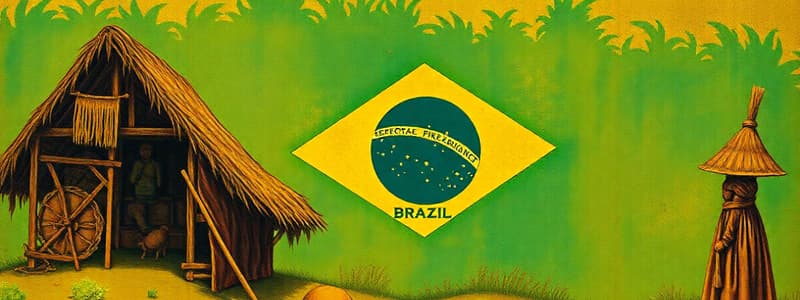Podcast
Questions and Answers
What is the main subject of the content provided?
What is the main subject of the content provided?
- The history of Brazil (correct)
- The history of Europe
- The history of Portugal
- The history of the Americas
The provided text directly relates to which country?
The provided text directly relates to which country?
- Colombia
- Brazil (correct)
- Spain
- Argentina
What aspect of Brazil is most likely to be discussed based on the title
What aspect of Brazil is most likely to be discussed based on the title
- Brazilian music genres
- Brazilian flora and fauna
- Brazilian cuisine
- Brazil's historical events (correct)
Which of the following is the most accurate translation of the provided text?
Which of the following is the most accurate translation of the provided text?
If this content were a book, what would be the most likely genre?
If this content were a book, what would be the most likely genre?
Flashcards
Brazilian History
Brazilian History
The history of Brazil is a complex and rich tapestry that encompasses the arrival of Portuguese colonists, the establishment of a vast colonial empire, the struggle for independence, and the development of a modern nation.
Portuguese Colonization
Portuguese Colonization
The arrival of Portuguese explorers in the 16th century marked the beginning of Brazil's European colonization. They established settlements along the coast and exploited the land's resources for sugar, gold, and other valuable goods.
Colonial Society
Colonial Society
The colonial period witnessed the development of a unique Brazilian society, characterized by the mixing of indigenous populations, European colonizers, and African slaves. This cultural fusion created a distinct Brazilian identity.
Independence Movement
Independence Movement
Signup and view all the flashcards
Post-Independence Brazil
Post-Independence Brazil
Signup and view all the flashcards
Study Notes
Período Pré-Colonial
- Indigenous peoples inhabited Brazil for thousands of years, with diverse cultures and societies.
- Different groups had varying social structures, ranging from nomadic hunter-gatherers to complex agricultural communities.
- Indigenous knowledge of the land and its resources was crucial to their survival and development.
- The arrival of Europeans fundamentally altered the indigenous way of life, leading to conflict, disease, and displacement.
Colonização Portuguesa (1500-1822)
- Pedro Álvares Cabral claimed Brazil for Portugal in 1500, marking the beginning of colonization.
- Initial interest was focused on natural resources, notably brazilwood, which contributed significantly to the early economy.
- The Portuguese implemented a system of land grants and exploitation focused on agriculture and resources.
- The plantation system, particularly for sugar cane, became dominant, relying heavily on enslaved African labor.
- The transatlantic slave trade had a devastating impact on African societies and contributed significantly to Brazil's demographic transformation.
- Colonial Brazil witnessed a complex social hierarchy based on ethnicity, race, and wealth.
- Portuguese administration was largely centralized but with significant variations in local practices.
- Numerous revolts and resistances to colonial rule demonstrated the resilience of the colonized populations.
- The transition from brazilwood to agricultural and mining activities marked the growth of the economy.
Independência e Império (1822-1889)
- Brazil's independence from Portugal was declared in 1822 by Dom Pedro I, marking a shift in political relations.
- Brazil became a constitutional monarchy, initially with Dom Pedro I at its helm, transitioning to a republic later.
- The initial years of independence faced political and economic challenges, marked by conflicts and disputes among various interests.
- The process of nation-building during this period involved conflicts over political power and the definition of the nation's identity.
- The economic growth continued, primarily driven by agricultural exports, especially coffee.
- The use of enslaved labor persisted significantly during this period, shaping the country's development.
República Velha (1889-1930)
- The establishment of a republic in 1889 led to significant political and social transformations.
- The overthrow of the monarchy marked a transition to a new political system with an emphasis on republican values.
- The period witnessed political instability and disputes between different political factions.
- The "Old Republic" operated with an oligarchic system, where powerful families or groups dominated politics and economic activities.
- The economic sector was heavily shaped by coffee production and exports, with significant concentration of wealth in a small group.
- Sociopolitical challenges and conflicts involving different segments of the population occurred.
Governos Populistas (1930-1964)
- Political turmoil and a military coup marked the period leading up to populist governments.
- Populist leaders rose to prominence, connecting with the masses by appealing to nationalistic and social reforms.
- The role of the state in social welfare programs and economic development became more prominent.
- Economic growth and political participation for segments of the population experienced growth, but also socio-economic inequality.
- The era saw significant economic development through state intervention and industrialization efforts.
Ditadura Militar (1964-1985)
- A military coup established a dictatorship in 1964, significantly altering the political and social environment.
- The repressive regime suppressed political opposition and civil liberties.
- The focus on economic development and stabilization involved significant state intervention.
- Human rights abuses and social unrest marked this period as a significant turning point in Brazilian history.
- The economic and political situation was marked by the struggle between opposing forces, and the aftermath brought the challenges of reconstruction and normalization.
Nova República e Século XXI (1985-)
- Brazil transitioned to a democratic system in 1985, entering a period of political and economic reforms.
- Challenges of economic stabilization, social issues, and corruption continued to shape the country's development.
- The country continued to experience periods of economic fluctuation, with efforts toward economic liberalization and growth and the rise of neo-liberal policies.
- The country grappled with growing inequalities and social and political challenges.
- Modern Brazil is characterized by a complex socio-political landscape, grappling with diverse social inequalities and cultural diversity.
- There are persistent inequalities among ethnic and socioeconomic groups persist in contemporary Brazilian society.
Studying That Suits You
Use AI to generate personalized quizzes and flashcards to suit your learning preferences.




